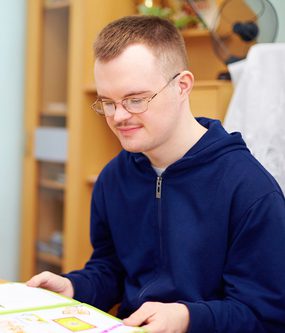Our Chief Executive, Lesslie Young, looks at how unhelpful assumptions and inaccurate labelling are experienced by many living with a learning disability.
Living with a long-term condition of any description can sometimes result in unhelpful, and generally inaccurate, assumptions and possibly, labelling by those who have a poor understanding of whatever the condition is. This is not only unwelcome but can create various unnecessary problems.
For example, there is often an assumption all people with epilepsy need to avoid flashing lights. The reality however is, only 3% of people live with photosensitive epilepsy.
These unhelpful assumptions and inaccurate labelling are also experienced by many living with a learning disability.
Throughout history people with learning disabilities and/or epilepsy have been misunderstood and mistreated as a result.
In 1913 The Mental Deficiency Act made provisions for the institutional treatment of people deemed to be “feeble-minded” and “moral defectives” and meant people with learning disabilities could be forced into asylums.
This paved the way for institutionalised care, with shocking conditions and treatment. People with learning disabilities were often grouped together with those living with a mental health issue and kept separate from the rest of society. This was a reality for many people with a learning disability in the UK up until the 1980s.
Since then, there has been a move to community care with self-directed support, to allow the individual to decide what care they receive.
Although institutions may be long gone, people with learning disabilities continue to be misunderstood and mischaracterised.
It may be uncomfortable to consider, but can we be sure the lessons learned earlier are still being put into practice when there is now so much pressure on the public purse?
Definitions are important
Learning disability and mental health are not the same. In fact, they are two very different conditions with very different needs and requiring very different care as a result.
A learning disability is defined by a reduced ability to understand new or complex information, to learn new skills, with a reduced ability to cope independently which started before childhood and affects someone for their whole life.
A mental health problem is a term used to cover a range of emotional, psychological or psychiatric distress. Unlike a learning disability, mental health problems can develop at anytime and can be treated.
Confusing or associating a learning disability with a mental health problem often means people with learning disabilities do not receive the support to meet their needs.
Additionally, people with learning disabilities can also suffer from a mental health problem.
Not distinguishing the two often means people with learning disabilities do not get access to the same treatment for their mental health problem as the rest of the population.
Significant progress has been made in the last century. People with learning disabilities are no longer hidden away from the rest of society in institutions.
However, it is important we continue on this path.
For people with learning disabilities to receive the care, support and access to opportunities which truly meets their needs, their condition should not be conflated with mental health.
Nor should they be categorised under the same budgetary headings for the convenience of those managing budgets and support.
Never has it been more important to ensure appropriate funding is made available to meet the specific needs of this population.




